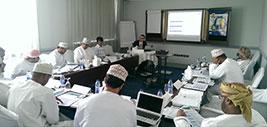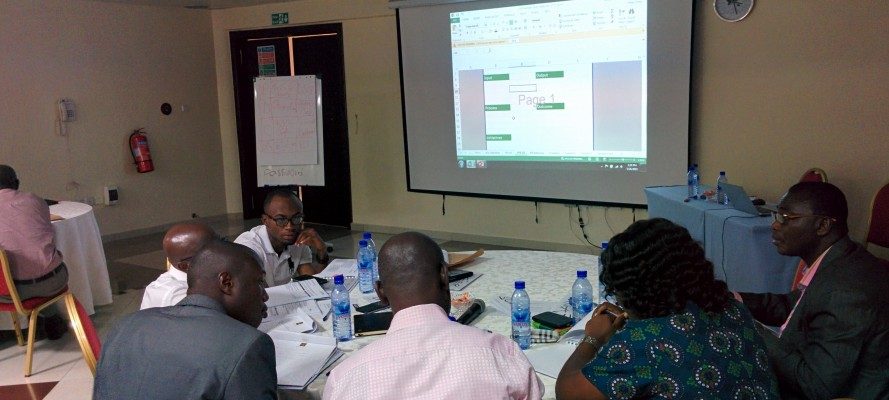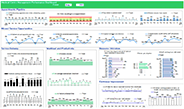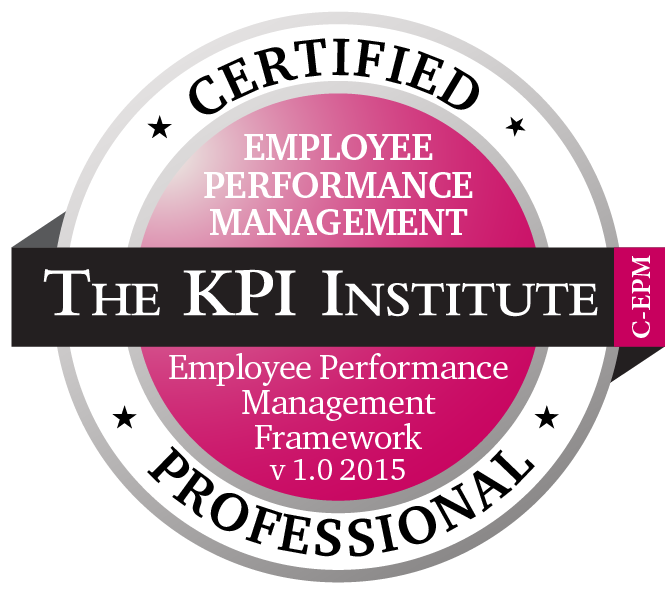C-EPM
Certified Employee Performance Management Professional

This course will clarify key, specific, detailed concepts and will provide practical tools and techniques for implementing, maintaining or improving the company’s employee performance management system. Attendees will gain exposure to best practices in the field of performance management and will learn how to establish and use criteria for evaluating performance.
3 Key Business benefits
- Enhance employee responsibility and productivity by implementing effective performance evaluations;
- Ensure an impartial treatment of employees through appraisals based on results and successful communication management;
- Tighten the link between strategic objectives and day-to-day actions, by focusing on results, thus improving organizational performance and business profits.
- Design, implement, monitor, evaluate and follow a performance management cycle in a successful manner;
- Improve the visibility and accountability related to performance expectations;
- Implement the knowledge acquired during the training course, by accessing a set of performance management tools and relevant templates;
- Identify the necessary corporate competencies and skill gaps to generate sustainable growth;
- Obtain a certified professional diploma in the field of Employee Performance Management, by following a robust learning experience provided by The KPI Institute.

- Understand the fundamentals of the performance management framework;
- Learn how to track the employee performance during each phase of the performance management cycle;
- Apply key tools to measure employees’ results in a fair and objective manner;
- Gain the knowledge of developing a Performance Management System business case and get stakeholders’ buy-in;
- Learn how to conduct efficient performance appraisals.
Day 1 – Introduction to the World of Employee Performance Management System
Employee Performance Management Context
- Benefits of implementing an Employee Performance Management System;
- Prerequisites of an Employee Performance Management System;
- Governance of the Employee Performance Management;
- Impact areas of an Employee Performance Management System;
- Performance Management Cycle;
- Activity: Discover the principles of a successful Employee Performance Management System.
Employee Performance Management System Architecture
- The link between strategic objectives and day-to-day actions;
- Tools and techniques used in performance management;
- Visibility and accountability through employee performance management;
- Activity: Integrate the Employee Performance Management System within the organizational system.
Employee Performance Management System Implementation Project
- Business case: needs analysis, stakeholders analysis, current state assessment, benchmarking, solutions;
- Employee Performance Management System project plan: objectives, activities, responsibilities, resources, budget;
- Activity: Create an Employee Performance Management System for your own organization.
Day 2 – Measuring Employee Performance
Establish performance criteria
- Cascading objectives and KPIs from organizational to departmental and individual level
- Competencies: definition and selection;
- Behaviors: definition and setting;
- Activity: Develop the individual scorecard.
Linking performance evaluation results to talent development
- Development plans;
- Career paths;
- Succession planning;
- Compensation and benefits systems;
- Activity: Understand the cost of a poor performance management system;
- Activity: Drive employee performance through leadership elements.
Day 3 – Nurturing Employee Performance
Employee Performance Management Cycle
- Employee performance planning;
- Mid-year performance review objectives;
- Point of contact and support for employees;
- Annual performance reviews;
- Activity: Communicate and promote the start of a new EPM cycle.
Employee performance appraisal meeting
- Performance appraisal meetings’ preparation;
- Feedback techniques and recommendations;
- Active listening;
- Performance conversations;
- Activity: Manage the appraisal challenges – difficult employees and situations.
Enablers of employee performance
- Employee engagement;
- Gamification;
- Coaching;
- Mentoring;
- Working environment;
- Activity: Where does engagement begin and end?
Review and Certification Exam
- Course review
- Certification exam
- Course materials:
- Course slides;
- Course notes.
- The Employee Performance Management Toolkit, including:
- Employee Performance Management Architecture;
- Job description;
- Employee Scorecard;
- Behaviors catalogue;
- Competences catalogue;
- Development plan;
- Portfolio of initiatives;
- Performance evaluation form.
- Premium Subscription on smartKPIs.com available for 6 months, providing access to 500 fully documented KPIs and over 20.000 KPIs enlisted;
- One research report from the Top 25 KPIs series;
- Free access to all webinars from the 2014 Performance Management series.
People interested in employee performance management
Entrepreneurs, analysts and professionals from any field, interested in employee performance management, will acquire the knowledge needed to understand the aspects that influence employee engagement and productivity and will access different methods that could help them improve the employee engagement levels within their companies.
Management representatives ( different levels within the organization, from top to line management)
Representatives of top/middle/line management and their respective organizations, regardless of their field of expertise, interested in measuring and evaluating employee performance, will be glad to discover a structured approach to the implementation of an employee performance management system, as well as best practices in the field. Moreover, for professionals who have just started such a project, this training course provides the knowledge required in order to understand the steps to be followed in the implementation process.
HR professionals
This course offers HR professionals, such as HR Consultants, HR Managers or HR Associates, the opportunity to have exposure to a rigorous approach to individual performance management, through the implementation of an integrated system based on KPIs, behaviors and competencies. After completing this course, participants can return to their organizations with a more coherent perspective on how an employee performance management system should work and how they could improve the existing architecture.

This course will be delivered by one of our trainers. Our faculty are certified master trainers, with abundant experience as both practitioners and education providers. Having both professional and academic experience, our trainers are able to bring the depth and breadth of their knowledge to our courses.
Being extensively certified reaffirms our credibility as a training provider and also supports our goal of delivering consistent quality to our valued clients.
For more details visit Our Faculty page.

Pre-course
This part of the learning experience is meant to ensure a smooth transition to the face to face training. Participants are required to take the following steps:
- Needs assessment – complete a questionnaire to determine a tailored and relevant learning experience;
- Pre-course evaluation quiz – take a short quiz to establish the current level of knowledge;
- Guidance and schedule – analyze a document presenting guidelines on how to maximize your learning experience;
- Forum introduction – share an introduction message to present yourself to the other course participants;
- Expectations – share your expectations regarding the training course;
- Pre-requisite reading – go through a series of documents to better understand the core-course content.

Core Course
During the three days of face to face training, the course is designed to facilitate experiential learning and ensure a high level of interactivity. Exercises used to enhance the development of competencies range from simple matching of concepts to extensive analyses of case studies.
The learning experience consists of:
- Discovering the theoretical concepts through interactive exercises;
- Solving different scenarios that might arise within an organization, in order to perform a comparative analysis and identify the best approach to be adopted;
- Using templates that you can afterwards customize to suit your organizational needs;
- Analyzing case studies and identifying solutions for the challenges encountered;
- Sharing your own experiences and good practices in the field.

Post-Course
This stage sustains and encourages the practical application of the techniques, strategies and processes learnt during the core course. In the post-course stage, participants are highly encouraged to:
- Forum discussions – initiate a discussion and contribute in a discussion opened by another participant;
- Action plan – create a plan for the actions and initiatives you intend to implement after the training course;
- In-house presentation – create and submit a short PowerPoint presentation to present your colleagues the knowledge you have accessed during the training course;
- Additional reading – go through a series of resources to expand your content related knowledge;
- Learning journal – reflect upon the entire learning experience and complete a journal.
The certification process is finalized only when you complete all of the 3 stages of the learning experience. Nonetheless, you will receive a:
- Certificate of Attendance: after participating at the 3 days of on-site training course;
- Certified Employee Performance Management Professional diploma: after you have successfully completed all of the 3 stages of the learning experience.
We strongly recommend that you obtain the Certified Employee Performance Management Professional title, as this endorses your skills and knowledge related to this field.
- The KPI Infographic;
- The qualitative reports: Performance Management in 2012 and Performance Management in 2013;
- Other resources consisting in articles, books and case studies relevant for employee performance management.
You can check our course locations and dates here.











